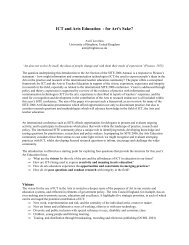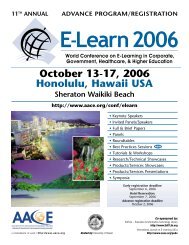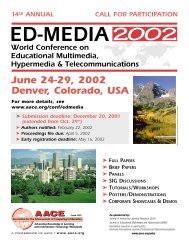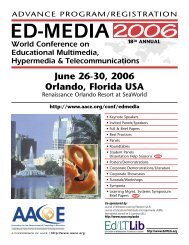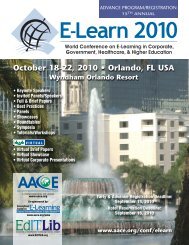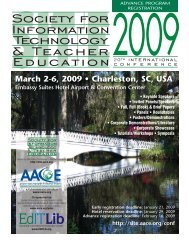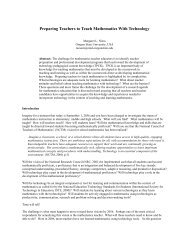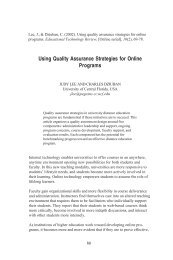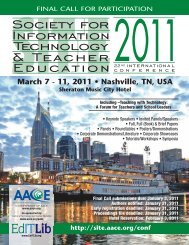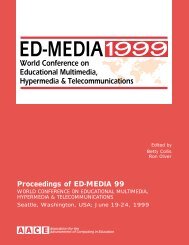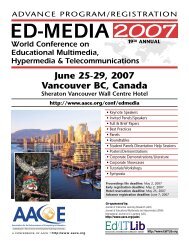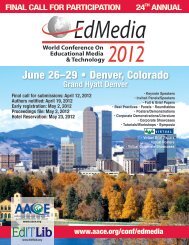ED-MEDIA 1999 Proceedings Book - Association for the ...
ED-MEDIA 1999 Proceedings Book - Association for the ...
ED-MEDIA 1999 Proceedings Book - Association for the ...
Create successful ePaper yourself
Turn your PDF publications into a flip-book with our unique Google optimized e-Paper software.
Using Multimedia to support mentors<br />
Simon Walker<br />
University of Greenwich<br />
United Kingdom<br />
Abstract: This paper reports on <strong>the</strong> development of a new system <strong>for</strong> training mentors of student<br />
teachers in Post Compulsory Education & Training (PCET) by a team of educational practitioners<br />
at <strong>the</strong> University of Greenwich with little previous experience in multimedia development. It's<br />
rationale is discussed in <strong>the</strong> light of <strong>the</strong> difficulties of providing training and support. A solution is<br />
proposed with regard to Dearing's National Committee of Inquiry (1997) into Higher Education in<br />
<strong>the</strong> UK, which states that, in cases where o<strong>the</strong>r methods have failed, improvements in motivation<br />
and understanding may occur through <strong>the</strong> use of new technology. The system combines <strong>the</strong><br />
development of an Interactive Multimedia Learning Environment (IMLE) with an On-Line campus.<br />
The prototype is discussed and issues of design heuristics are raised.<br />
Context<br />
The Post Graduate Certificate of Education programme <strong>for</strong> pre-service full-time students is taught jointly by staff at<br />
<strong>the</strong> University of Greenwich and by staff in <strong>the</strong>ir own institutions throughout <strong>the</strong> student teacher's work experience.<br />
The programme is delivered over a single academic year. Between 250 - 350 students each year are taken on and are<br />
trained to be teachers in a variety of academic and vocational subjects. Each student teacher is supported by a<br />
subject mentor in a range of culturally and geographically diverse PCET institutions. The mentor has two basic<br />
generic tasks encompassing a range of subsidiary roles that need to be per<strong>for</strong>med. Firstly, <strong>the</strong> mentor organises<br />
appropriate teaching experiences and secondly, <strong>the</strong> mentor supports <strong>the</strong> student teacher's professional development<br />
in teaching <strong>the</strong>ir subject areas. The mentor's ability to respond to <strong>the</strong> student teacher's professional development<br />
hinges on <strong>the</strong>ir own understanding of <strong>the</strong> relationship between <strong>the</strong> knowledge, skills and processes of mentoring and<br />
<strong>the</strong> support provided by <strong>the</strong> University <strong>for</strong> <strong>the</strong>m in this role.<br />
Following research conducted by questionnaire with 10 university tutors and 117 student teachers, a number of<br />
factors were identified as affecting <strong>the</strong> quality of mentor training.<br />
(a) Diminishing resources resulted in a lack of time <strong>for</strong> any sustained level of support <strong>for</strong> training <strong>the</strong> mentors.<br />
(b) The difficulty of arranging F2F meetings because of issues of physical distance and/or clashes with timetables.<br />
Research was also conducted with 36 subject mentors to confirm <strong>the</strong> acceptability and content of using an ITC<br />
system <strong>for</strong> supporting <strong>the</strong>m in this role.<br />
A proposal to develop interactive multimedia using hybrid CD ROM technology was supported jointly by <strong>the</strong><br />
School of PCET and Academic Development Group at <strong>the</strong> University of Greenwich. It was seen as a possible<br />
solution to <strong>the</strong> above problems <strong>for</strong> a number of reasons:<br />
• interactive multimedia environments may extend <strong>the</strong> setting and amplify opportunities <strong>for</strong> learning in a dynamic<br />
way<br />
• CD-ROM technology is relatively inexpensive and allows <strong>the</strong> storage of large amounts of (non-editable)<br />
interactive support material<br />
• by using <strong>the</strong> potential of hybrid CD-ROM, <strong>the</strong> integration of web browsers with embedded links makes<br />
communication with an On-Line Campus with dedicated sites <strong>for</strong> supporting mentors possible.<br />
Design heuristics<br />
Learning how to develop and produce interactive multimedia involved a significant learning curve. For many of us,<br />
<strong>the</strong> greatest educational technological development over <strong>the</strong> last fifty years has been <strong>the</strong> Overhead Projector. Unless



